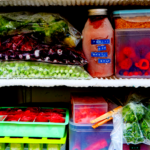
Using cold to help preserve products dates back decades ago when people used to snow and ice to preserve their meat. It is said that a lot of people contracted pneumonia after trying to freeze chickens by stuffing the carcasses with snow. It was not until the 1930’s that foods that are frozen started to be sold commercially following the method of quick freezing.
How freezing can help preserve food and keep it safe for consumption?
Freezing of foods can delay spoilage, and it can keep food safe by preventing microorganisms from growing, and by slowing down the enzyme activity that causes food to go bad. As the water in the food freezes, it becomes unavailable to those microorganisms that need it for growth. However, these microorganisms remain alive when frozen so food must be handled safely before freezing and after they are defrosted.
The effects of freezing on food nutrients.
Freezing has little effect on the nutrient content of foods. Some fruits and vegetables are blanched before freezing to inactivate enzymes and yeasts that would be responsible for food spoilage, even in the freezer. This process can cause some of the vitamin C to be lost. Despite these losses, fruits and vegetables are frozen in peak condition right after harvesting, and they are often higher in nutrients than their fresh counterparts.
Produce that is harvested can take days to be sorted, transported, and distributed to stores. During the whole process, vitamins and minerals on foods can be slowly lost. Fresh fruits and green vegetables can lose 15% of their vitamin C content every day when they are kept at room temperature.
There is almost no vitamin, and mineral loss from frozen fish, meats, and poultry because protein, vitamins A and D and minerals are not affected by freezing. During the defrosting of meat, fish, and poultry, there is a loss of liquid that contains water-soluble vitamins and mineral salts, which will be lost in the cooking process if the liquid is not recovered.
Foods that should not be frozen.
Freezing can spoil some foods because the formation of ice crystals can cause breakage of the cell membranes. This has no effects in terms of safety. However, the food loses its crispness or firmness. Salad vegetables, soft fruits, and mushrooms are just some of the foods that do not tolerate freezing well.
Foods with a higher fat content like sauces and cream tend to separate when they are frozen. Commercial freezing quickly freezes foods so that small ice can form around them. This can cause less damage to cell membranes so that the quality is less affected.
Can food be kept in a freezer for a long time?
Food can be safely kept in the freezer for 3 to 12 months without the loss of quality. Keeping times depending on the food and the product label can provide the best indication.
Here are some freezer tips:
- Freezers should be kept at or below -18°C
- In contrast to refrigerators, deep freezers should be packed tightly as this allows the fridge to function better.
- Using appropriate packagings such as freezer bags and plastic containers will help protect foods and prevent “freezer burn.”
- Do not place hot foods straight into your unit’s freezer because it will raise the temperature immediately and it can affect other foods. It is best to let it cool down before placing it in the freezer.
- Frozen food should be defrosted properly before cooking. Food that has been frozen and defrosted should not be refrozen
To ensure that your freezer and cooler are working properly and that they are operating at the right temperature, you can schedule regular preventive maintenance with your local service provider. There are local service providers like the commercial refrigerator repair in Las Vegas, who can monitor the temperature for you and repair what needs be so your unit will work at its best.
